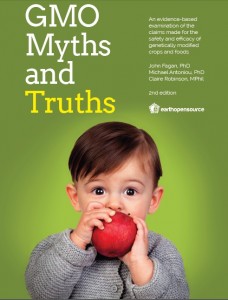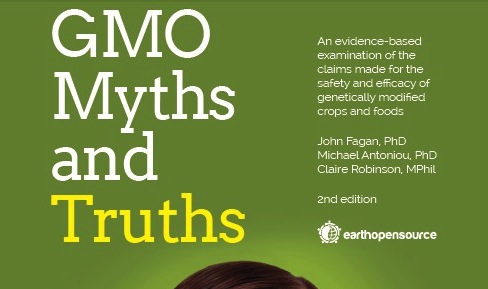The scientists behind a landmark report that demolished GM industry safety claims say the evidence of risk and actual harm from GM foods has grown in the two years since its publication.
GMO Myths and Truths, published in 2012 by a team of genetic scientists at London’s King College, concluded that GM crop technology was “fundamentally unsound” and posed “scientifically proven risks to human and animal health”.
One-by-one, the original 124-page report dismantled the long list of “far reaching claims” that the biotech industry uses to promote GM. Having examined a large body of peer-reviewed studies the King’s College scientists concluded that there was no scientific evidence that GM crops were safe; toxicological studies on animals had revealed unexpected harmful effects; there was a striking absence of long-term safety studies; there had been no intrinsic increase in yields with GM crops and pesticide used had increased with their use, not fallen as the industry claimed.
 GMO Myths and Truths generated headlines around the world when it was published. But not everyone appreciated it as the report’s authors – Dr John Fagan and Dr Michael Antoniou – say in their introduction to the updated 2014 edition: “GMO lobbyists launched endless attacks against it on online forums. These people are online 24/7 defending GMOs. They criticise GMO Myths and Truths every time someone cites it.”
GMO Myths and Truths generated headlines around the world when it was published. But not everyone appreciated it as the report’s authors – Dr John Fagan and Dr Michael Antoniou – say in their introduction to the updated 2014 edition: “GMO lobbyists launched endless attacks against it on online forums. These people are online 24/7 defending GMOs. They criticise GMO Myths and Truths every time someone cites it.”
“These people are online 24/7 defending GMOs. They criticise GMO Myths and Truths every time someone cites it”
Undeterred by the persistent attacks, Fagan and Antoniou have continued to gather new evidence as it has emerged. They write: “The GMO debate is far from being over, as some GMO proponents claim. Instead the evidence of risk and actual harm from GM foods and crops to health and the environment has grown in the two years since we brought out the first edition.”
New evidence contained in the updated report shows:
• A review that is claimed by pro-GMO lobbyists to show that 1,700 studies show GM foods are as safe in fact shows nothing of the sort. Instead many of the 1,700 studies cited show evidence of risk.
• A review purportedly showing that GM foods are safe on the basis of long-term animal studies in fact shows evidence of risk.
• A laboratory study in human cells shows that very low levels of glyphosate (the main chemical ingredient of Roundup herbicide, which most GM crops are engineered to tolerate) mimicked the hormone estrogen and stimulated the growth of breast cancer cells.
• A rat feeding study led by Professor Gilles-Eric Séralini, which found toxic effects from a GM maize and tiny amounts of the Roundup herbicide it is grown with, was retracted by a journal editor for unscientific reasons.
• Claims that an EU-funded research project shows GMOs are safe are not evidence-based, since the project did not even test the safety of any commercialized GMOs.
• Claims that Europe is becoming a “museum” of farming because of its reluctance to embrace GM crops are shown to be nonsensical by research showing that Europe’s mostly non-GM agriculture out-yields the USA’s mostly GM agriculture with less pesticide use.
• Contrary to claims by GMO proponents, the real reason GM golden rice isn’t available has nothing to do with anti-GMO activists and everything to do with basic research and development problems.
The report’s authors say: “The good news is that GMOs are not needed to feed the world. The report shows that there are far better ways of ensuring a safe and sustainable food supply.”
• Download the full report here




